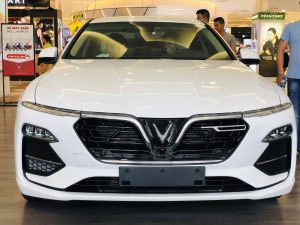Earlier this year, Vietnamese automaker VinFast, a subsidiary of the massive Vingroup conglomerate, announced it is planning to build a $2 billion electric vehicle (EV) production facility in North Carolina. The total investment value, including battery production and other ancillary facilities, could be as high as $6.5 billion. Scheduled to be operational by 2024, the facility will create thousands of jobs and crank out up to 150,000 electric vehicles per year. For its part, North Carolina has rolled out the red carpet, offering $1.2 billion in incentives to VinFast.
This is an interesting role reversal from the world of global supply chains we are accustomed to, where historically it is American, Japanese and Korean companies offshoring manufacturing to places like Vietnam to take advantage of lower production costs. A Vietnamese conglomerate investing billions in a technology and capital-intensive production facility in North Carolina and President Joe Biden touting the American jobs it will create is a neat way to flip the script. So what is the logic behind VinFast’s move?
The first thing to look at is the structure of the automobile manufacturing industry in Vietnam’s backyard in Southeast Asia. Thailand has historically been, and remains, the regional leader in automobile production, mainly for export. In recent years Indonesia has been catching up, driven by ballooning demand in its domestic market.
Thailand and Indonesia are also looking to carve out footholds in global EV supply chains, and these efforts are being backed by powerful state-owned companies. By comparison, VinFast is a relative newcomer to auto manufacturing and will be facing stiff competition from these more established regional incumbents.
The second is the demand profile and infrastructure for electric vehicles, both globally and within Southeast Asia. Europe, the United States, and China are the strongest drivers of global demand for electric vehicles right now. According to Forbes, EV sales in the U.S. are forecast to hit 670,000 in 2022, a 37 percent increase from the previous year. And this figure is expected to keep growing.
The same demand for EVs does not yet exist in most of Southeast Asia, and even if it did, the charging infrastructure is not in place for domestic markets to absorb EVs at the same scale. That means, for the time being, if EVs are going to be an important component of auto manufacturing in Southeast Asia demand is going to come primarily from export markets.
VinFast does have a large domestic manufacturing base in Hai Phong which is expected to eventually be capable of producing 950,000 units annually. The output from this facility can serve export markets in China, South Korea, Japan, and around the region. But when it comes to tapping the U.S. electric vehicle market VinFast made the strategic calculation that offshoring manufacturing to North Carolina is the right play rather than basing production in Vietnam and shipping units across the Pacific.
It’s a bold move and we of course don’t know how it will play out. The U.S. market is crowded and competitive. And it will obviously be harder for VinFast to control production costs in the United States, which is one of the big comparative advantages of locating manufacturing in Vietnam.
But in the absence of comparable local demand for EVs, and given that it will be competing against a regional auto export giant like Thailand, Vietnam decided to go big by moving manufacturing straight to the U.S. where it can tap directly into a hot and growing market. And in doing so, it also sends a message about Vietnam’s rising profile in the global economy and its ability to upend traditional structures of production by offshoring capital and technology-intensive manufacturing to a high-income country.

































